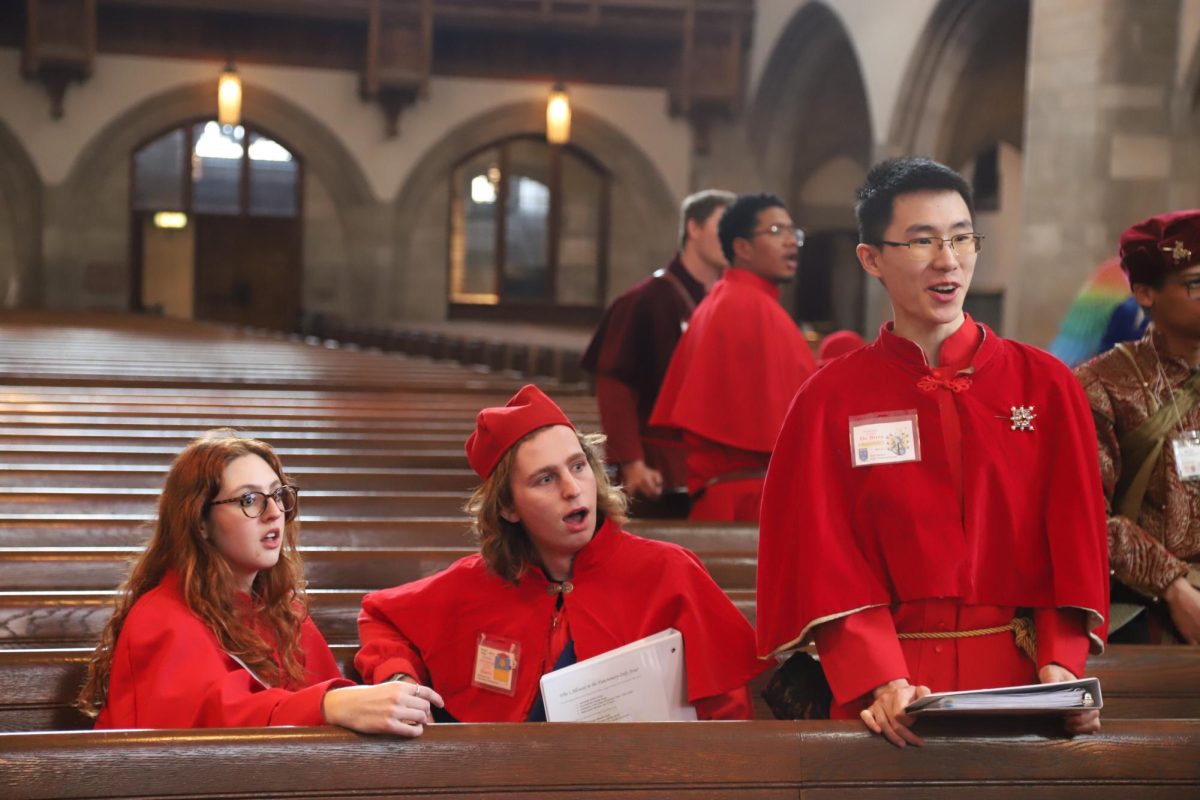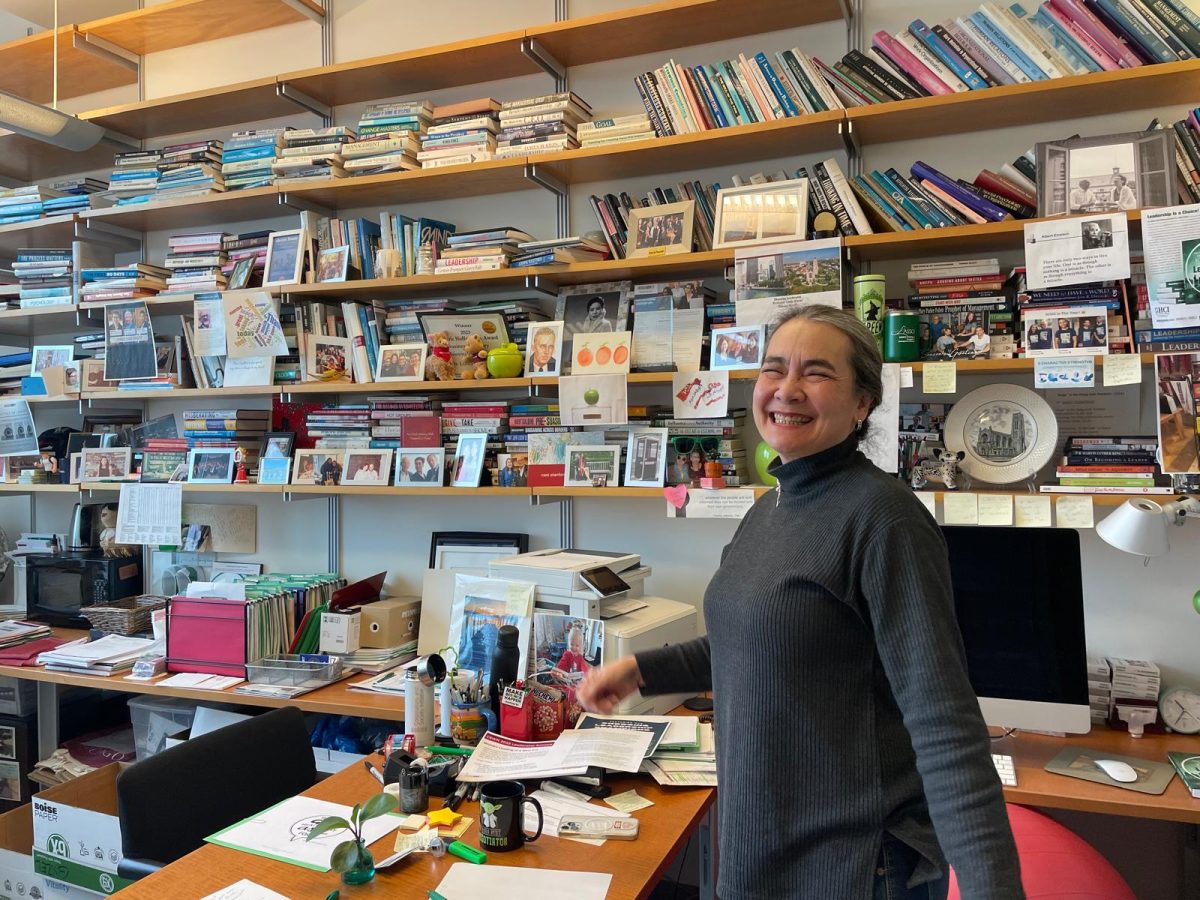Comparative human development professor and practicing psychoanalyst Bertram Cohler (A.B. ’61) wants you to call him “Bert.” From a booth in the C-Shop, as students bee-line over to say hello, the longtime Hyde Parker weighs in on student stress, “that kid,” and the prospect of a University institute devoted to Sigmund Freud. Just don’t call him Professor Cohler.
Sara Jerome: Has the University changed a lot in your time here?
Bert Cohler: The students are as good or better. The students are the best students in the known universe! I’ve turned down jobs at other colleges in order to be able to teach U of C students….
You can tell a University of Chicago student. My kids were at Grant Park for the celebration for Obama—isn’t it cool to have a president of the United States who’s a colleague at the University of Chicago? I think it’s just awesome. Anyway, they were at the rally, and one of them was standing there—it was a student—with his Marx–Engels Reader. You know that reader? And [my son] John had said, “Huh, you’re a U of C student.” He said, “How do you know?” And John said, “You’ve got your book with you!” So, we carry our books with us wherever we go. That’s part of the U of C.
But there really is a U of C culture, and there really is a kind of U of C student. The diversity! I sort of see it as Close Encounters of the Third Kind—that’s a movie. There’s this mountain, and they may be a football player or a fraternity member or an economist, but they gravitate to the University of Chicago if they like to ask questions.
SJ: With that kind of continuity between generations of students, have you noticed things that consistently challenge them?
BC: Marx. The students have problems with Karl Marx. His writing is very difficult in the first quarter, and it has a bit of a shock value to learn how difficult he is.
And I’m not sure the students believe Freud. I wear another hat as a psychoanalyst, and I’m sure that my psychoanalysis informs my teaching. I’m very much concerned about the climate of the classroom and students’ lives because they have lives outside the classroom and you can’t learn if you’re anxious. I try to reduce anxiety so they can really focus on the text.
SJ: Do you think students are more stressed these days?
BC: I think students are more stressed—yes. I think with the realties of the job market—so many of our students [major in] economics….
A lot of our fundamentals students will take Economics 198 and 199 with Allen Sanderson and calculus and statistics and they get jobs working for consulting companies—and it doesn’t need to make a fetish out of it.
I have my quarrel with University of Chicago economists who believe the market is everything. I think current times suggest they may be a bit off base. I know they say the market will win out if we give it long enough—it’s just people who are the problem. But it’s people who run the economy, so….
It’s really the classics department and physics that make this University what it is. I wouldn’t want a Sigmund Freud Institute. I despair of the fact that so many of our students take economics and want to be businessmen.
SJ: Changing themes a little, I heard from some of your former students that you’re interested in new media and blogging.
BC: Right, I’m an early adapter. This is a new world, and the reality is students text each other—even sometimes during class. And there are blogs, and a lot of what students are doing is online. We have to always be looking to the future and ask how education has to change in the context of new media…. Now I have an iPhone so I’m trying to learn how to use it.
SJ: You are an early adapter!
BC: My kids say “Dad, you’re an early adapter.” My students say, “What? You have an iPhone?”
SJ: Should I look out for your blog?
BC: I’d blog if I had time. I don’t have time. I teach 24/7, I teach seven courses a year, I supervise residencies in the department of psychiatry, and try to be a responsible citizen of the University in addition to my own writing and scholarly work. Given all that, and the constant stream of emails that I try to answer—I read about blogs, I’m interested in personal documents and the kind of documents people write about their lives and blogs as the new form of the memoir or diary or autobiography, and I’ve written some about that. But I don’t think I could ever write my autobiography.
SJ: What would be your hesitation?
BC: I think it’s hard to write about one’s own life. I admire the people who are able to do it. I read memoirs and write about memoirs and autobiographies and blogs, but I don’t think I could, at least at this point.
SJ: Should every student take Self?
BC: Yes. Absolutely. It’s the mother of all core courses. And in classroom discussions, students are always asking questions, and I say, “Wow, I’d never thought of that.”
SJ: Are you just saying that?
BC: No—the undergraduates are great! In fact, I like all my students to call me by my first name, because we’re in seminar together and I want to emphasize that we’re all equal before the texts.
SJ: Do any particular insights from undergraduate students come to mind?
BC: There’ve been a couple of wonderful things that will happen. A couple of years ago I had a student who was a fundamentalist—an evangelical—I don’t know how he ended up at the University of Chicago. But he began to talk about his views and at first the students challenged him and then they began to listen to him and understand why he held the views he had and he began to listen to them, and by the end of the year we were all talking together, and it’s that kind of moment that is so good.
SJ: Is it ever hard to get it to gel like that with a particular group?
BC: Yeah, it may take a while. It’s funny, some classes just work better than others. I always ask, “Is it me? Have I done something?” But my friends who teach… they’ll say, “My 9:30 is so great and full of sparkle, my 10:30 class, it’s hard to get them to talk.”
SJ: Could it be, at different class times, just being tired?
BC: It could be tired. Or the particular group of students—if you have a few students who are particualry vocal…. Sometimes there are a few students who monopolize the discussion.
SJ: [Laughs] Has that student always existed?
BC: Yes, since I was in the College, right exactly. It’s one of the hardest jobs of the instructor to help bring everyone into the conversation and not have a few people monopolize the conversation.
Sometimes I have a students who feel particularly unworthy; they shouldn’t be in the College, “the admissions office must’ve made a mistake.” And then when they speak it’s wonderful.
SJ: Any thoughts on where the College is headed?
BC: The College in my day, remember…had a much more planned curriculum with syllabi and everything. So I think, in a way, it was much more carefully dosed and integrated.
But the reality is, faculty no longer want to teach those kinds of courses and maybe students probably don’t want to take them, so times have to change…. I’m assuming we want to teach the best of the classical texts, which is why I think everyone ought to do Greek and Latin. But we ought to know the hip, trendy stuff as well.
SJ: Like what?
BC: I think we ought to know the new media, and listen to hip-hop and appreciate the new music. You can’t just listen to classical opera, you’ve got to listen to Philip Glass, and participate in culture as it is and kind of make sense of it all. Each of us then kind of finds our own path to the College. Then you have the rest of your life to put it all together again.









